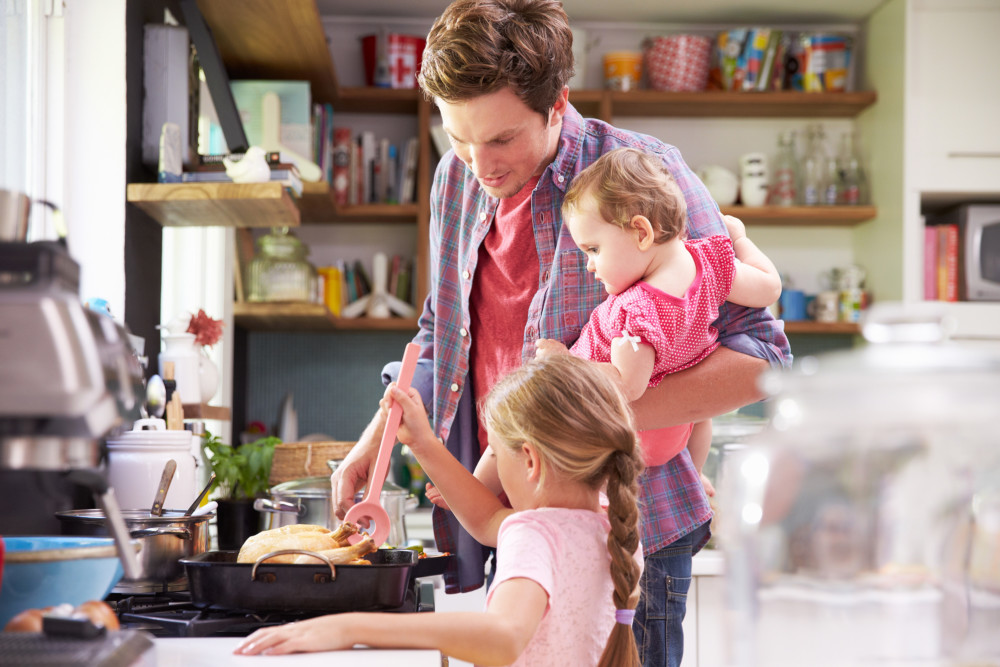By Danielle Braff
Chicago Tribune
WWR Article Summary (tl;dr) Jean Fitzpatrick, a licensed relationship therapist who works with couples at all stages including pre-baby and postpartum says that as parents continue to give more of themselves to their children, they have less to give to each other, and these less satisfying romantic relationships appear to be suffering.
Chicago Tribune
First comes love, then comes marriage, then comes the baby and the end of the fairy tale.
Relationships suffer for about two out of three couples within the first three years of having a child, according to research by the Seattle-based Gottman Institute.
Most couples regularly respond to the needs of their children first, neglecting their partners. As time goes on, the relationship balance can continue to unravel, said Michael McNulty, master trainer at the Gottman Institute.
“It’s a real common challenge,” McNulty said. “Every couple is challenged with, ‘How do I cover all my bases with my life and my partner with my new child.”
The basis of any strong relationship is a good strong friendship, which involves feeling appreciated and turning toward each other for help, McNulty said.
“It becomes trickier when couples are parents, and the challenge is figuring out how to work together on sleep deprivation, how to figure out how to have a strong friendship and have a physical connection,” he said.
There’s extra pressure for parents to spend more time with their kids today, and working and stay-at-home mothers spent more than 14 hours a week with their children in 2010 compared with the 10 hours they spent with them in 1965, according to the Pew Research Center. The result: even fewer hours to devote to relationships.
But since children need their parents more than partners need each other, it’s tricky for most parents to tear themselves away from their children.
“I think there is a general feeling nowadays that kids rule the roost, and I think that this is terribly out of balance,” said Jennifer Landa, an OB-GYN and author of “The Sex Drive Solution for Women.”
What began as putting children first has spiraled out of control, leaving parents feeling depleted and empty, stressed out and exhausted.
“These high stress levels and low self-care habits frequently lead to irritability, and that commonly is taken out on those closest to us, especially our spouses,” Landa said. “This can destroy relationships slowly over time.”
As parents continue to give more of themselves to their children, they have less to give to each other, and these less satisfying romantic relationships appear to be suffering, says Jean Fitzpatrick, a licensed relationship therapist in New York who works with couples at all stages including pre-baby and postpartum.
This appears to be a recent phenomenon.
In past generations, it was often expected that mothers would devote themselves to child rearing and fathers would focus on work, and they would organize couple time in a more formal way.
“Today’s couples are likely to have less gendered relationships, and the research tells us that these are more satisfying,” Fitzpatrick said. This can be positive because both partners are familiar with each other’s worlds.
“On the minus side, sometimes, they both feel overloaded,” she said.
If everyone is working and doing the chores and taking care of the children and essentially having it all, then there’s not much time left to focus on the relationship, and relationships need time and maintenance, or else they’ll flounder.
Emily Paster was determined not to let that happen.
The Illinois food writer, author of “Food Swap,” and mother of two kids ages 9 and 12, said she’d seen many women focus all of their energy on their children and she’d watched their marriages suffer.
So she decided to do things differently when she had her own children.
Paster and her husband, Elliot Regenstein, senior vice president for advocacy and policy at the Ounce of Prevention Fund, actively work on their relationship, scheduling date nights, romantic evenings and getaways sans children at least every other year. And instead of dining as a family, she often feeds her children earlier in the evening, so she can eat with her husband at 8 p.m., just the two of them.
“My husband and I have adopted the belief that the best thing we can do for our kids is to stay married,” Paster said.
Dain Heer, co-creator of Houston-based Access Consciousness and the author of books on relationships and other topics, said this is key.
“You got together because you liked each other in the first place, and what ends up happening with kids is it feels like all of your time is taken up with trying to handle the kids, and trying to make enough money to try and handle the kids, and then trying to handle life all at the same time,” he says. “So if you make some time to get together and recognize that you’re together in this, you’re not separate.”
And while the balance will never be perfect on any given day, the quest for it is a baby step in the right direction.














































































































































































































































































































































































